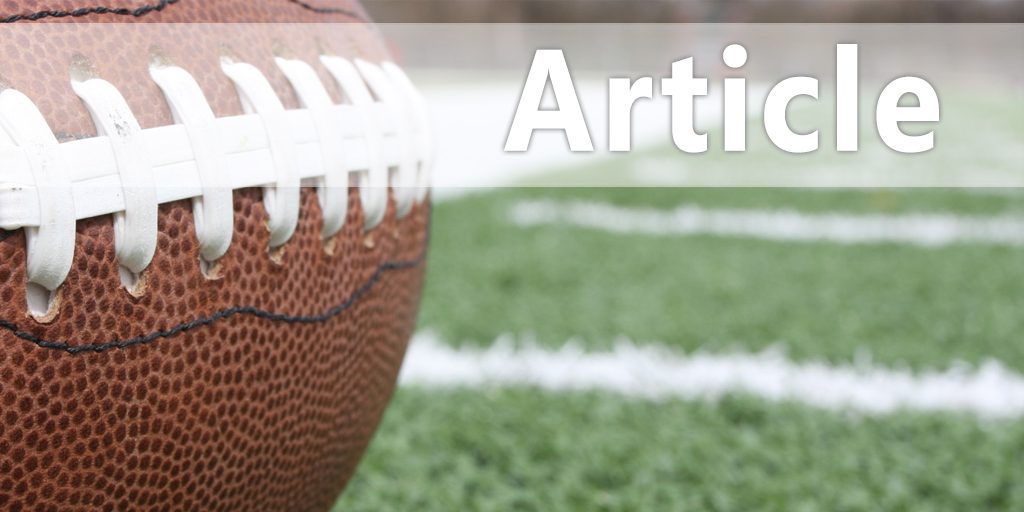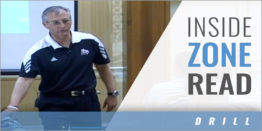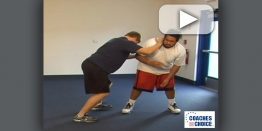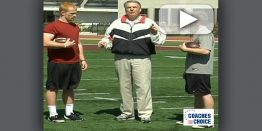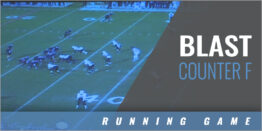| Defensive Game-Week Preparations
I have coached at all levels. I started as a high school coach and then I moved on to a Division III school in Ohio. I was a graduate assistant for Don Nehlen at Bowling Green State University and was an assistant coach there with Denny Stolz. From there, I went on to the University of Washington with Don James and coached the defensive line. I left Washington and went to coach a Division l-AA school as a head coach. In 1996,1 went to The Ohio State University and have been there ever since. I have been the defensive coordinator for the last six years. It has been a great time for me and a lot of fun. I want to start with something special that we do at Ohio State. This is something Coach Jim Tressel puts a lot of emphasis on. We do a lot of teambuilding. Two weeks ago, we met with all of our seniors and presented them with the statistics of how our teams have done over the past six years. I asked them what they would like to accomplish as a group. They will meet five or six times before spring ball to discuss what they want to accomplish in their senior year. I tell them that this is their baby, and I do not care what format they use, or what they put down, or even really what their goals are. After spring football, they will all get together and finalize their goals. Then, they present them to the coaching staff. The seniors present what they want to accomplish, what they want to be known for, and how they want to get it done. This is their idea and we do not restrict them on anything. Last year, they had, as one of their goals, to have swag. I am not sure what swag is, but we did not stop them. I figure that if you win, you can have swag. After the presentation for the coaches, the seniors will present their ideas to the entire team. We, as coaches, will use this to get points across to our players throughout the year. As an example, "They want to compete with relentless effort." If we have a practice where we do not get good effort, I can bring them in as a group and tell them that one of their goals was to compete with relentless effort and that they did not give it on that day. Now, it is their idea and it becomes important. Before, if I said to a player that we did not get great effort, it was not as important to him. This has worked really well for us. Our seniors will get up before every game and talk about it. Our team has really embraced it. I feel that our defense has a real sense of ownership in what we are trying to accomplish. Last week, we had a basketball tournament with the team. We were at our arena at midnight. That is the only time that we can get some time in the arena. We have a 3-on-3 and a 5-on-5 tournament. We will put a freshman, sophomore, and a junior together as a team. We will put players together that would not normally hang out with each other. This forces them to get to know their teammates a little better. We try to make it fun and we have pizza for them at the end of the night. We will have a Softball tournament outdoors underneath the lights. We get some of the Ohio State girls softball team pitchers to pitch. It is kind of silly, but it is amazing how embarrassed our players are when they cannot hit the pitch. They get a good laugh out of it. They take pride in winning, though. We will have a track meet where we get to the track at 6 a.m. Our players talk all the time about fast they are and how great they are. Now, we give them the chance to prove it against each other. We will do fun things and run some relays. It really is nothing more than building up our team and the camaraderie that goes with it. Defensively, we want to have 11 guys flying around the football. We want our guys playing extremely hard every play. We think that this type of teambuilding helps with that. We like to do nonfootball related things together as a group. Our regular football training is crazy. Sometimes I worry that we spend too much time training. We think that it is helpful to do things outside of football together. Another thing that we do is we give a test to our guys on the last day before fall camp is over. We have them write down the name, number, high school that he went to, and hometown of every player on our team. They only have so much time to complete the form. In the end, the player that has the most correct answers will only have to run one sprint or conditioning drill for that day. The ones that have the fewest correct answers will stay out on the field until the end. We feel that we get our players to know each other a little better with this activity. This way, our freshmen will know what our seniors are about, and our seniors will know a little about our freshmen. Our guys will do a good job with it because they would rather do this than run. Let me tell you about our practice schedule for the week. Sunday, for us, is a practice day. We want to try to get some things accomplished. We want to see our players on Sunday and find out how they are feeling after the game. We want to see what kind of movement they have. If they have an injury, we want to address it then, not on Tuesday. We will run them a little and get a light cardiovascular activity in them. We want to go over yesterday's game and get that out of the way. We will try to plant a seed about next week's opponent as well. Sunday is a big day for us. Something that Coach Tressel does on Sunday that has been big for us is to emphasize game situations in a team meeting. Following is a list of some of the things that we go over: • First-and-ten We call this our "blueprint." The situations are critical with us. We evaluate them every day in practice. I believe this really helps us zero in on the process rather than the just the outcome. If we win the majority of these situations, we feel we have a great chance of winning the game. Coach Tressel stands up front and goes over every one of those situations, both offensively and defensively and then as a team. As an example, the opponent may have had 33 opportunities at first-and-ten, and we held them under three yards 17 times. Offensively, we may have had 30 opportunities at first-and-ten, and we had gains of three or more yards 13 times. As a team, we were 30 of 63, which is not very good. We can coach tougher in that we have to work harder during the next week of practice in order to fix the problem. "Coming out" is where we tell our defense that if the opponent starts inside the 10, we have to make them punt without getting a first down. Our punt return team has to get the ball across the 50-yard line. That is the only way we can accomplish our coming out goal. Both criteria have to be met for us to be successful. The two items that we emphasize the most and that we feel are the most important throughout the year are turnovers and explosive gains. An explosive gain for us is 15 yards or more on a running play and 20 yards or more on a pass play. We feel like, and statistics prove it out, if we win those two items, we will win the game. Our guys have bought into this. On the field, we talk about pre-snap preparation. What is the situation? This helps us slow the game down a little. Sometimes the game goes so fast that players do not even know what is going on. If we have them think, pre-snap, what the situation is, they can be better prepared. If it is a first-and-ten situation, through our preparation we know what plays the opponent likes to run. One of the things that we always emphasize is the next play is always the most important. This is something that is very critical, and we have ingrained it into their brains. No matter what happened, good or bad, on the previous play, our next play is the most important. One of our defensive goals for each game is to hold the opponent to 14 points or less. To me, that is low. I have tried to argue it with Coach Tressel. That was our goal years ago when everybody was running the isolation play. Now, with all of the spread offenses and no-huddle, I think that goal is a little low, but I have been unsuccessful in getting it changed. We want to try to keep their rushing average below 3.3 yards per carry. We want their passing average to be below five yards. We are going to try to get three turnovers. If we can get five three- and-outs, we will count that as one turnover. We do not want to allow any 15-plus-yard runs. We cannot allow any 20-plus-yard passes. For the red zone, we do not want to allow a touchdown in the red zone. These are all of the situations. After Coach Tressel has his team meeting, we will have our own defensive meeting and go over the same defensive situations again. It is just repetition over and over again to emphasize our points. We do all of these things on Sunday. We get all those things out of the way on Sunday, and then yesterday's game is in the past. To plant the seed for our next opponent, we will put a picture of the opponent's quarterback in the locker of every defensive player. Our defensive players will see that the very first thing when they come in on Sunday. We want them to know that we must affect that quarterback. We are going to really emphasize the quarterback. It has been my experience through the years that if we can get after the quarterback, we have a chance to win the game. If the quarterback is successful, we probably are not going to win the game. From day one, we talk about the opposing quarterback. We have to give him different looks, contain, sack him, pressure him, and flush him out of the pocket–all those things. That is the first thing we do on Sunday. This is the guy. If we have a quarterback that is successful against us, we will meet right after the game to talk about it. We want to know what happened. We want to know why we did not get after their quarterback. We will also go through all of the opponent's personnel. We make our guys memorize some of the things about each one of their players. On Friday, our seniors are going to stand up and talk about each one of the opponent's offensive players and tell us something about each one of them. Monday is an off day for us. The NCAA makes us give players one day off a week during the season. We tell our guys that it is an academic day. If they have any schoolwork, special tutoring, or they need to see a professor, they are to do it on Monday. As a defensive staff, we develop and finalize our game plan. At the end of Monday night, our game plan is going to be completed. We are a 4-3 defensive team. However, we will play a lot of 3-4 as well. We are either going to play a base defense, a nickel defense, where we will take a backer out and put in a safety, or a dime defense, where we take the linebacker out and put a corner in. When we are talking about game planning, we are going to look at the opponent to see what their personnel groupings are. We just recently played the University of Arkansas. Arkansas had eight personnel groupings that they worked like crazy. Each one of them was a big part of their offense. They did a great job of disguising their personnel groupings. They might have three backs on the field at one time and come out in a no-back offense. It is just getting more difficult all the time to figure out what the offense is doing. We look at their personnel groupings and try to figure out who we will want to have on the field at that time. Then, we will come up with two or three things that we would like to do in that situation. We will take each one of our packages and come up with three or four different coverages, three or four different zone pressures, and maybe four or five different blitzes. We will do this with our 4-3 defense, our 3-4 defense, and our nickel and dime packages. What we are trying to do is just like what the offenses are trying to do to us. We are going to try to give them a lot of different looks and make them prepare for different fronts and schemes. Monday is a big day for us as far as coaches. We have four coaches on defense. The first thing we do on Monday is break down our opponent's situations. Defensively, each one of us has a few different situations that we are responsible for in getting the information and statistics together. Once we have that done, we come together as a group and start to work on our game planning. The other thing that we will try to do on Monday is to start working on third-down situations. We believe third-down situations are critical. Tuesday is our first day of heavy practice. Tuesday, we try to really concentrate on first down. We spend a lot of time on first-down-pass and play-action-pass situations. In the earlier part of the year, we will spend more time on individual drills than we do as the season goes on. We do two things that I think are good. First, we have a 10-minute run-through. This is a change from when we had a 10-minute walk-through, when we would have guys just messing around. We have an offense from the scout team. We do not have helmets on. It is slow motion and technique sound, and they better have their knees bent and in a good football position. Secondly, the other thing that we can do here is to work on the tempo of the no-huddle offense. We have the defense turn their backs. When I blow my whistle, the offense is in their stances and ready to go. At the same time, when I blow my whistle, the defense gets their signal and turns around. We are trying to simulate the hurry-up offense. It is not a crazy racing type of drill. We want to emphasize getting lined up and being ready to play in a hurry-up situation. We are getting a run-through look and the players learn a lot. In every practice, we will have ones versus ones for at least five minutes. This is something a little different from what most coaches will do but Coach Tressel wants to get this done. We will have the number one offense run against the number one defense for three offensive plays. One will be on the left hash mark, one will be in the middle of the field, and one will be on the right hash mark. On Tuesday, we concentrate on first-and-ten, and we will run it from the three positions on the field. After that is over, we will break up and have our normal scout teams that we will go against. We might work on third-and-medium for a while. We will then go back and compete against our first team, again working on third-and-medium. This way, we are working on some good physical play, but also getting in the repetitions. A long time ago, I learned the four rules of learning:
On Wednesday, we run a similar practice. We will run our red zone defense against our number one offense and we will run the two-minute drill against our number one offense. On Thursday, we go through our checklist. This is similar to what everyone else does. Coach Tressel has his own checklist that we go through. This checklist will have every possible situation we may be confronted with during that game. As a coach, we need to know what our call is in any situation such as first-and-short yardage. What does the opponent like to do on the first play of the game? Over the past five games, what does the opponent like to do after a turnover? What is the opponent likely to do after they complete a pass on first down? Those are our checklist items we monitor to make up our call sheet. On Thursday, we will have a 30-script practice where we script 30 plays and run them from different parts of the field. We make sure that we call all of our defenses at least once during those 30 plays. We want to make sure that we are on all hash marks and on all ends of the field. We also make the last play on Thursday the last play of the game. Friday is a big day for us. Our seniors take over our practice on Friday. The seniors get up and talk about their opponent. We make sure that they are sincere and respect their opponent. If you have a player that does not respect a lesser opponent, this is where you can get into trouble. Next, the seniors will go over our blueprint. They will go over all the things we need to do in order to win the game. We go over what we have done in the past for each one of those situations. After that, we will do the same thing, but this time by position. Here is what we need to do as an offensive line in order to be successful. Here is what we need to do as linebackers in order to be successful. This again, is for all the seniors. On game day, we always start with team. Everything has to be team oriented. We talk about one of 11. This game is one of the 11 games that we will play during the season. We emphasize that this is an important game, but it is just one part of the season. Next, we talk about tackling. We talk about fanatical effort. We focus on the process. We have to play the first play first. After that play is over, we will play the second play. We will never have a practice where we do not give great effort and then let it go. If we have a practice where we do not feel we are getting our best effort, we will make them stay and watch the film of practice and then ask them about their goals for the year. We do not really call anybody out or call anybody's name, but we ask them as a group if this is the type of effort that they feel will allow them to reach their goals. We really got our point across when we did that. My time is up. Thank you. |
